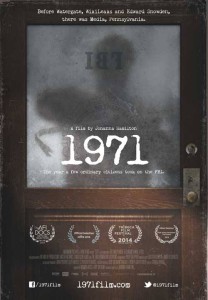Johanna Hamilton’s documentary has intrigue and suspicion. It makes you question the legitimacy behind our privacy.
1971 is about the shocking true story of intrepid activists obtaining and distributing confidential FBI documents. The files were finely searched through, and then sent to major news publications. This act of defiance led to an unraveling case that had America looking at the FBI under an uncomfortably naked light. A particular program titled Cointelpro had been chronicling information that some would define as redundant, but president J. Edgar Hoover would vouch it added more depth to ongoing investigations. The break-in was an operation hatched by people with honest integrity who had no idea it would open endless moral dilemmas.
Hamilton’s 1971 is a good doc. Her thankful and trustworthy interviewees give informative answers and walk-throughs of how they remember the events. The film moves accordingly with an editing style that’s upbeat but stays within safe aspirations. The documentarian also takes a few pointers from the equally intriguing Man on Wire, and offers the audience reenactments that are tense while dodging contrivances through ham-handed performances.
However, the documentary is missing a sense of urgency behind the subject mater. The film is competent as is the talent establishing the production, but Hamilton treats the taut paranoia like a Sunday drive. She doesn’t need to manipulate our emotions with gimmicks, but this is a mystery in need of exciting components aside from the supplied non-fiction. 1971 is revealing and riveting, but also tied down by how soft it is.





Be the first to comment